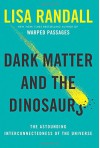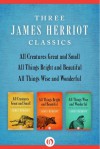SusannaG - Confessions of a Crazy Cat Lady
Just another GR refugee. Other than that, I had a stroke in 2004, and read almost anything I can get my hands on, though I have a particular weakness for history, mystery, and historical fiction.
Currently reading
Halloween Bingo Update 1: The Canterville Ghost

The Canterville Ghost is a charming novella by Oscar Wilde, dating, I believe, to about 1887. The American Minister to the Court of St. James rents the country house of the Canterville family, despite being informed that it's haunted by a dire ghost, because he doesn't believe in ghosts. Also he figures his incorrigible twin boys (known generally as "Stars and Stripes") will be more than a match for it, if it even exists.
There is indeed a ghost - Sir Simon de Canterville, who has been a successful haunt since 1585. This time, however, his haunting fails, and the only one who is apparently moved is the Americans' daughter, fifteen-year-old Virginia.
I may have read The Canterville Ghost many years ago - but then again I may just have seen the movies. There's a version from 1944, which my mother grew up with, with Robert Young, Margaret O'Brien, and Charles Laughton as the Ghost, but that's not the one I first saw. That version was one for TV made in the mid-1970s, with David Niven as the Ghost, and it may be the adaptation I've seen that's closest to the novella. (There are also more modern adaptations, but the only one of those that I have seen is the one from the mid-80s, with Alyssa Milano and John Gielgud as the Ghost.) There is apparently yet another version "in preparation" now. With Stephen Fry and Hugh Laurie attached.
At any rate, this was a charming start to the bingo, and it fulfills the first call: "Ghost."

Called and Read:
Ghost - The Canterville Ghost, by Oscar Wilde.

 11
11
Off to the Beach

So y'all have a great time while I'm gone! I plan to read (and am packing) a good number of books - we'll see how many I get through.
How to be a Victorian
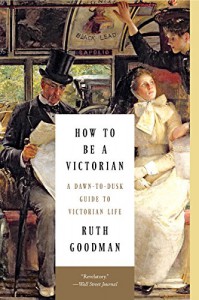
How to be a Victorian, like Ruth Goodman's How to be a Tudor, which I read in January, is a fine study of a foreign country - in this case the Britain of roughly 150 years ago.
It is filled with strange, often horrifying or amusing details. For example, that genteel ladies might want to take exercise, but were deathly afraid of being caught at it. (Their solution was to either take long walks, with a package under their arm, to suggest *really* being out on a charitable - and thus socially acceptable - errand, or to perform calisthenics, which would not disturb their movable wombs, in fashionable suits in the privacy of their own bedrooms.) That doctors were not against corsets, but only "tight lacing," which some particularly fashion-obsessed ladies used to reduce their waists to as little as 13 inches. That a large proportion of the population, most or some of the time, were hungry, and their nutrition was actually made worse by the rise of the Temperance movement. (The lure of the cities, even of their slums, was that you might eat better than poor in the countryside. Even if that "better" wasn't very good.)
It is also an excellent study of why regulations are a necessary part of society, for the protection of all of us. We want laws saying we can't be forced by our employers to work 12 or more hours a day. We want laws mandating safety equipment in factories. We want laws saying the makers of food and drugs can't lie in advertisements about what's in their products, and sell us watered chalk as milk, and opium as a safe and gentle herbal baby care treatment. We want laws preventing industrialists from hiring six-year-olds as coal miners. Because the Victorians had to fight for each and every one of those protections.
Let's not forget them, or their achievements.
The Game is (Nearly) Afoot
And I am playing. And I have a card!

Some should be no problem, some I have something in mind already (Raymond Chandler, here I come), and some I may never get to (Genre: Horror). But I plan on having a ton of fun.
NetGalley Find: Rules of Magic
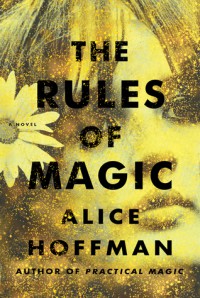
The Rules of Magic is the prequel to Practical Magic. And it's available for request on NetGalley (US preferred). I've tossed my hat in the ring; we'll see if I get lucky or not.
The Invention of Nature

The Invention of Nature is not flawless (for me the weakest chapter was on Humboldt and Thoreau - but I've always thought Thoreau was over-rated), but it is a fascinating read.
Because before Carl Sagan's Cosmos, there was Alexander von Humboldt's Kosmos. (I don't think this is accidental, somehow.) Humboldt's was even more popular in the 19th century than Sagan's was in the 20th. Humboldt, in fact, was probably the most famous scientist of his own time - the Einstein of the 19th century. There was mass mourning when he died at 87, and mass celebrations, across the planet, on the centenary of his birth (September 14, 1869).
And today he is mostly forgotten, except in South America. Though people may wonder why there's a Humboldt Park in Chicago, a Humboldt County in California, and a Humboldt Current in the Pacific, and why many species are Humboldtii. Who was this Humboldt person, anyway?
He was the Energizer Bunny of naturalists. He never shut up, and most people didn't try to stop the font of knowledge (to quote his great friend, Goethe). Should they try, if they succeeded for more than a sentence or two, it was a miracle. He also refused to be stopped by piranhas, crocodiles, erupting volcanoes, great heights (though the very top of Chimborazo finally beat him), outbreaks of anthrax, or anything else.
He made two great expeditions - to South America, in his early thirties, and to Siberia, when he was sixty. (He longed for the Himalayas, but the British East India Company refused him permission to go.) He spent all his inherited money on science, and was forced to become a royal chamberlain at the Prussian court, waiting attendance on his king, while he longed for the Himalayas, or, at the very least, Paris. At night he wrote book after book, for some fifty years. And he found many readers.
A handful of chapters are about not Humboldt himself, but some of the men he inspired. Simon "Iron Ass" Bolivar. Charles Darwin. Henry David Thoreau. George Perkins Marsh. Ernst Haeckel. John Muir. These chapters are of varying quality, but they show that we have to thank Humboldt, at least in part, for everything from the theory of evolution to Art Nouveau to the Sierra Club.
Some Science Ideas from my Library
I know that there's been a suggestion that we read more science together; these are just some books my own library has that I think look interesting.
A Rustle of Silk
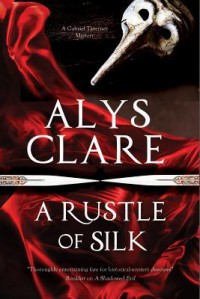
A Rustle of Silk is ... OK, I guess.
It's 1603, Elizabeth I is dead and England awaits the arrival of their new king, James VI of Scotland, who will be James I of England. Meanwhile, Gabriel Taverner, a former sailor in the Royal Navy, and now a doctor (he claims to be a physician, but knows more about surgery), is trying to set up a practice in his old home town. Someone's leaving him vile little "presents" of dead animals on his doorstep, and they don't suspect a cat.
And then a man is found dead. It turns out to be his brother-in-law, a silk merchant. Was it suicide, or murder?
The prose style and characterization were good.
On the other hand, the mystery didn't make much sense at a certain level, and we had a villain with talking disease. (No cat in his lap this time, though!) Taverner seemingly can't decide if he's a physician or a surgeon, which were two very different jobs in the period, performed by different people of different experiences and social ranks. (A physician learned his craft at a university, and observed clients and made prescriptions. He might inspect their urine, but physical interaction with patients' bodies was usually limited to bleeding them due to an "inbalance in the humors." A surgeon, on the other hand, was of a lower class in society, did not need to go to a university, and had the practical experience of removing limbs, with more or less success. Physicians were far more respected than surgeons, who often did double duty as barbers.)
Also, the occasional word choice struck me as non-period ("opportunist" would not be in use for some 200 or 250 years after this is set), and in the understandable desire to avoid info dumping, Clare has Taverner unaware of some things he really should have known, despite having been 15 years at sea. (In particular, that suicides could not receive a decent Christian burial in a churchyard.)
I might read another in the series, but I doubt I'd go out looking for one in particular.
Calamity in Kent

Calamity in Kent, though published in 1950, has the feel of a novel published in 1930. (Therefore the offhand mentions of the Black Market and rationing felt a little strange. But they're very accurate for 1950 Britain.)
I just couldn't like this one very much. I think in part because I never really took a liking to our narrator, a journalist. And in part because this novel's plot is very much "Scotland Yard Inspector decides his journalist friend, Jimmy, is the best choice to investigate weird locked-room murder, and lets him go to it." Which is the epitome of "not believable."
This one has not aged well.
U.S. Kindle Sale: Miscellaneous
Currently $1.99: The Unpleasantness at the Bellona Club, by Dorothy L. Sayers. The Golden Compass (aka Northern Lights), The Subtle Knife, and The Amber Spyglass, by Phillip Pullman. Jack of Shadows, by Roger Zelazny. Cheaper by the Dozen, by Frank Gilbreth and Ernestine Gilbreth Carey.
Currently $2.99: Three James Herriot Classics (All Creatures Great and Small, All Things Bright and Beautiful, and All Things Wise and Wonderful), by James Herriot. Brideshead Revisited, by Evelyn Waugh.
Currently $3.99: And the Band Played On, by Randy Shilts. Silent Spring, by Rachel Carson.
The Summer Before the War

It is the summer of 1914, and Beatrice Nash, 23, finds herself in Rye, in Sussex, attempting desperately to get a job as a teacher at the local grammar school. (As Latin mistress, of all things - very shocking for a female!) She has fled her late father's family, wealthy but highly controlling, to try to make her own, independent life, and is not finding it easy. For one thing, she's neither as old or as plain as they were expecting.
Down in Rye, she becomes involved in the lives of her sponsor there, Agatha Grange, Agatha's husband, John ("something at the Foreign Office"), and their two nephews, close as sons, Hugh Grange and Daniel Goodham. Hugh is studying medicine, and Daniel has aspirations as a poet.
When the war does break out, life becomes ever more complicated. Young men start to join up. There are panicked runs on food and other goods in the stores. The mayor's wife is even more impossible than usual. Young ladies of good breeding but little brain start handing out white feathers to young men not in uniform. Poor harmless dachshunds are attacked. And the town does its bit by taking in Belgian refugees.
There are four narrators - mostly Beatrice or Hugh, but occasionally also Agatha or "Snout," a boy in the village. Simonson writes well, so it's not really an issue; it's always easy to tell them apart.
This novel is every bit as good as Simonson's first novel, Major Pettigrew's Last Stand, and a good historical novel. (I don't recall seeing any historical detail that struck me as improbable or just wrong.) A thoroughly enjoyable read - I dithered between 4 and 4 1/2 stars.
New York 2140

New York in the early 2140s, some 125 years in the future, is in some ways the same as it always has been - the crowds and the crime and Central Park and the street urchins and the folks trying to make a fast buck (legally or illegally), the immensely rich few bumping up against great masses of much poorer people, and the illegal immigrants and the squatters and the undocumented and the refugees, but much is changed, too.
For one thing, the sea level is now 50 feet higher. The ultra-rich have fled to the highest points of the island, where the world's most expensive real estate has been built, while everything below 30th St. is permanently at least partially under water. The people, however, have refused to leave, and have turned lower Manhattan into "Super Venice." They have turned skyscrapers into co-ops, with sky tunnels linking them, and all the former streets are now canals full of vaporettos, gondolas, water taxis, and private boats ranging in size from the tiniest zodiac or kayak to deluxe speedboats and salvage tugs.
This novel is the story told by selected inhabitants of one of those co-ops - the one in the old Met Life building - from the super to the hackers living in tents on the farm level to the hot-shot young financier. From the police detective to the undocumented teenagers living in a zodiac in the boathouse, and the immigration lawyer and the animal rights activist/video star/pilot of the airship Assisted Migration, as well.
It's told in about as many narrative styles as there are narrators, from the theatrical to the police procedural. (In many ways the narration reminded me of that of his Mars series, of which I am a fan.) Normally I take a deep breath at a novel with as many narrators as this one attempts, but Robinson's a good writer (he's won the Hugo, the Nebula, and the World Fantasy Award), and in my opinion he pulls it off.
It's not a flawless novel, but I couldn't stop reading it.
P.S. I wanted to put my emoticon at "giddy," but alas, that was not an option.
U.S. Kindle Sale: Miscellaneous
Currently $1.99: The Judas Goat, by Robert B. Parker. The Shattered Tree, by Charles Todd.
Currently $2.99: His Majesty's Dragon, by Naomi Novik.
 6
6
Agnes and the Hitman

Agnes publishes her syndicated food column under the name of "Cranky Agnes," inspired by her anger management issues; she is, however, justifiably cranky one night when a teenaged mobster shows up with a gun, attempting to kidnap her dog. (She whacks him over the head with a handy cast iron frying pan.)
Luckily for Agnes, her uncle the semi-retired(?) mobster has sent a hitman, Shane, to look after her. And the five million dollars that might be stashed in her house. What ensues are more attempted hits (on the dog, Agnes, and assorted other people), police investigations, non-police investigations, flamingos, explosions, frying pans, larceny, and a high-society mob wedding.
It's a mob-themed romantic comedy-suspense thriller-farce. And a lot of fun to read.
Six of Crows
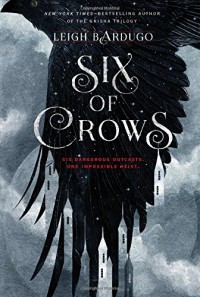
Six of Crows can probably best be described as "Oceans Eleven in a fantasy universe." A gang of criminals can get immensely rich, beyond their wildest dreams, if they pull off an impossible crime - in this case, breaking a man out of the world's toughest prison.
It manages to be a good read despite having 6 or 7 narrators. My heart drops as a general rule when I see that many narrators listed, because mostly authors can't pull off that much character creation. Leigh Bardugo did a pretty good job here - she labels the narrator of each chapter up front (so you don't have to guess), doesn't switch in mid-chapter or even mid-paragraph (I've seen that, and it's not pretty), and they're each distinct characters - you can tell them apart, they all have believable motivations, and they each read differently.
Bardugo does not info dump, I am thankful to say.
The novel ends on quite a cliffhanger. (I was not happy, as I was under the impression that this was a stand alone. Also my library does not have the sequel.)
I was also not happy that the novel ended at 76% of the ebook. Did we really need a quarter of the space for not one, but two previews of other books?
 7
7



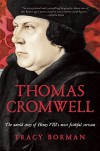






















 3
3






